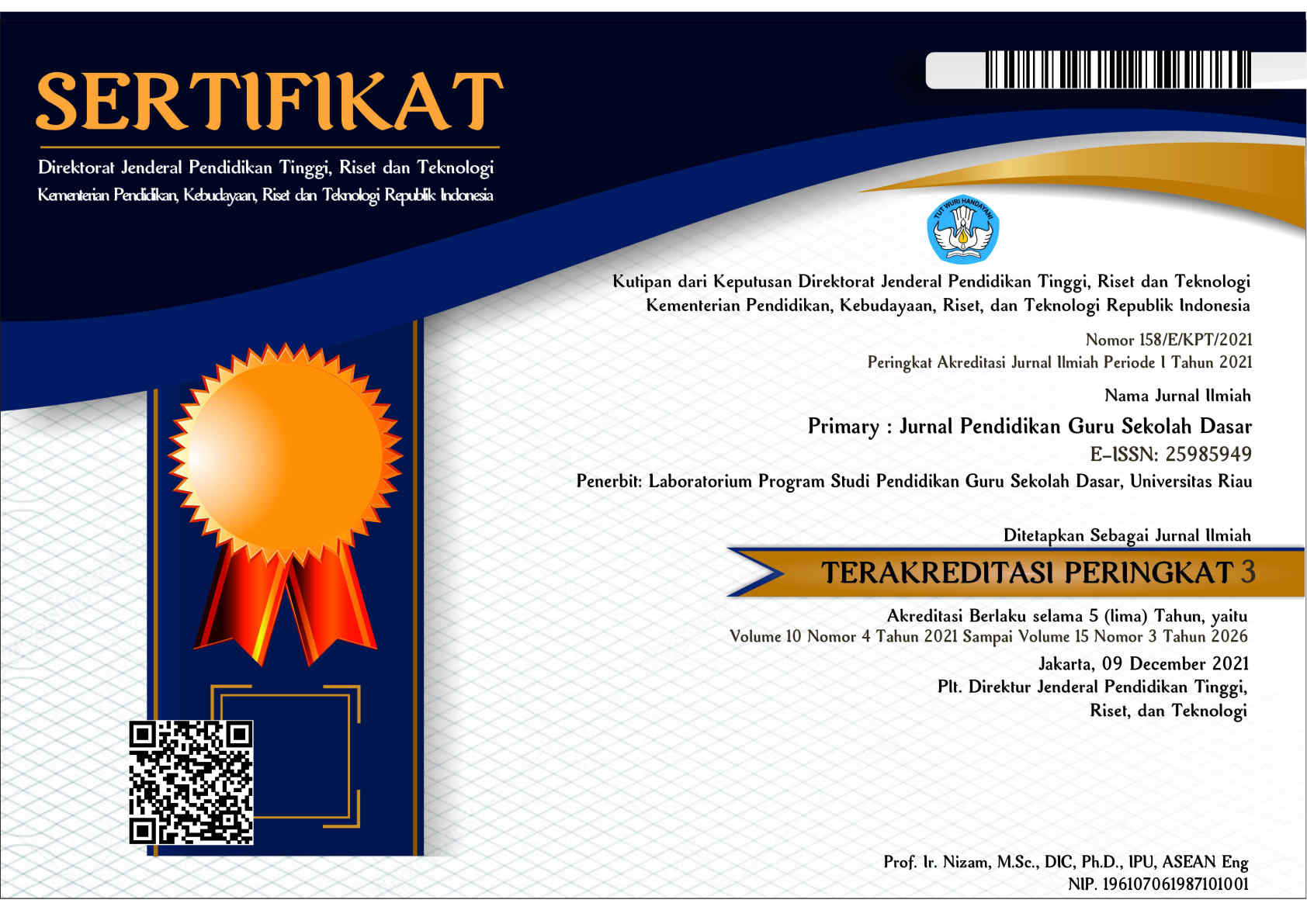PENGARUH PERAN ORANG TUA TERHADAP HASIL BELAJAR TEMATIK SISWA KELAS V
Abstract
The role of parents is one of the factors that influence student learning outcomes so the purpose of this study is to determine the effect of the role of parents on students thematic learning outcomes of class V of MI Al-Ma'arif Merauke.This research is a quantitative correlation and expose facto research conducted at MI Al-Ma'arif Merauke. The subjects of this study were students of class V B MI AL-Ma'arif totaling 32 students. Data collection techniques used are questionnaires and documentation. The instruments used are questionnaire sheets and documents. While the data analysis techniques used are correlation test, hypothesis test (t). Calculation of hypothesis testing used SPSS version 21 using the product moment correlation formula. The results showed that there was a relationship between the role of parents on students' thematic learning outcomes, this was indicated by the results of the correlation coefficient of 0.389 > rtable of 0.349 and a significance level of 0.028 < 0.05 with a low level of influence. t test results revealed that the t value of 2.310 > ttable 2.042 with a significance value of 0.028 < 0.05 and the results of the coefficient of determination (r2) of 15,1%, this shows there is an influence of the role of parents on the thematic learning outcomes of students.
Keywords
Full Text:
PDF (Bahasa Indonesia) (Bahasa Indonesia)References
Alimuddin J. (2018). Optimalisasi Peran Orang Tua Dalam Pembelajaran Tematik Integratif di Sekolah Dasar. Prosiding Seminar Nasional. Universitas Muria Kudus: Kudus.
Arifin. (2012). Pokok-pokok Pemikiran Tentang Bimbingan dan Penyuluhan Agama. Jakarta: Bulan Bintang
Cindy P. (2017). Hubungan Bimbingan Orang Tua Dengan Prestasi Belajar IPS Pada Siswa Kelas IV SD Negeri. Skripsi. Tidak Diterbitkan. Fakultas Keguruan dan Ilmu Pendidikan. Universitas Lampung: bandar lampung.
Daradjat. (2004). Ilmu Pendidikan Islam. Jakarta: Grafindo.
Djamarah, S. B. (2011). Psikologi Belajar. Jakarta: PT. Rineka Cipta.
Eliyana K. (2016). Hubungan Perhatian Orang Tua Dengan Hasil Belajar IPS Pada Siswa Kelas V Sdndigugus Ki Hajar Dewantara Kabupaten Semarang. Skripsi. Tidak Diterbitkan. Fakultas Ilmu Pendidikan. Universitas Negeri Semarang: Semarang.
Frankel, J. P., & Wallen N. E. (2018). How to Design and Evaluatte Reserch in Education. New York: Mc Graw-Hill Companies, inc.
Fredy, F., Tembang, Y., & Purwanty, R. 2019. Analisis Kepuasan Orangtua dan Siswa terhadap Kualitas Layanan Pendidikan Dasar. Musamus Journal of Primary Education, 59-66.
Hamzah. B. U. (2013). Teori Motivasi dan Pengukurannya. Jakarta: PT. Bumi Aksara.
Hasbullah. (2011). Dasar-Dasar Ilmu Pendidikan. Jakarta: Rajawali Pers.
Hurit, A. A., & Harmawati, D. (2019). Analisis Kesiapan Guru dalam Mengimplementasikan Kurikulum 2013 di SD Inpres Gudang Arang Merauke. Musamus Journal of Primary Education, 116-123.
Jihad, Asep, & Haris, A. (2012). Evaluasi Pembelajaran. Yogyakarta: PT. Bumi Aksara.
Kurniaman, O., & Noviana, E. (2017). Penerapan Kurikulum 2013 dalam meningkatkan keterampilan, sikap, dan pengetahuan. Primary: Jurnal Pendidikan Guru Sekolah Dasar. 6(2), 389-396.
McNeal Jr, R. B. (2014). Parent Involvement, Academic Achievement and the Role of Student Attitudes and Behaviors as Mediators. Universal Journal of Educational Research. 2(8), 564-576.
Muchuchuti, N. (2015). The Influence of Parental Involvement on the Learning outcomes of their Children: A Case study of Primary School Children in Matabeleland Regions. IOSR Journal of Research & Method in Education (IOSR-JRME). 5 (6), 25-32.
Prastowo, A. (2014). Panduan Kreatif Membuat Bahan Ajar Inovatif. Yogyakarta: Diva Press.
Prayitno. (2011). Panduan Panduan Bagi Penyelenggara Program Penerapan Belajar Kegiatan Pengawasan Bimbingan dan Konseling di Sekolah. Jakarta: PT. Rineka Cipta.
Purnamie, T. (2014). Peranan Oraganizational Citizenship Behavior. Bandung: Mitra Wacana Media.
Purwanto. (2013). Evaluasi Hasil Belajar. Yogyakarta: Pustaka Belajar.
Reni A. & Huwadi. (2004). Psikologi Perkembangan Anak Mengenal Sifat,
Bakat, dan Kemampuan Anak. Jakarta: Grasindo.
Sapaile, B. I. (2010). Konsep Penelitian Ex-Post Facto. Jurnal Pendidikan Matematika. 1(2), 105.
Slameto. (2010). Belajar dan Faktor-Faktor yang Mempengaruhinya. Jakarta: PT. Bumi Aksara.
Sugiyono. (2016). Metode Penelitian Kuantitatif, Kualitatif dan R&D. Bandung: Alfabeta.
Sukardi, Ketut D., & Kusumawati, N. (2008). Proses Bimbingan dan Konseling di Sekolah. Jakarta: PT. Rineka Cipta.
Wahy, Hasbi. (2012). Keluarga Sebagai Basis Pendidikan Pertama dan Utama. Jurnal Ilmiah DIDAKTIKA, 12(2), 245-258.
DOI: http://dx.doi.org/10.33578/jpfkip.v9i4.7986
Refbacks
- There are currently no refbacks.
Copyright (c) 2020 Andreas Au Hurit, Nur Eka Lestari, Agus Kichi Hermansyah

This work is licensed under a Creative Commons Attribution-NonCommercial-ShareAlike 4.0 International License.
____________________________________________________________
Primary: Jurnal Pendidikan Guru Sekolah Dasar
Secretariat
Program Studi Pendidikan Guru Sekolah Dasar
Gedung B1, FKIP Universitas Riau
Kampus Bina Widya Km. 12,5 Simpang Baru Panam
Pekanbaru Riau Indonesia 28293
e-mail : primary@ejournal.unri.ac.id



